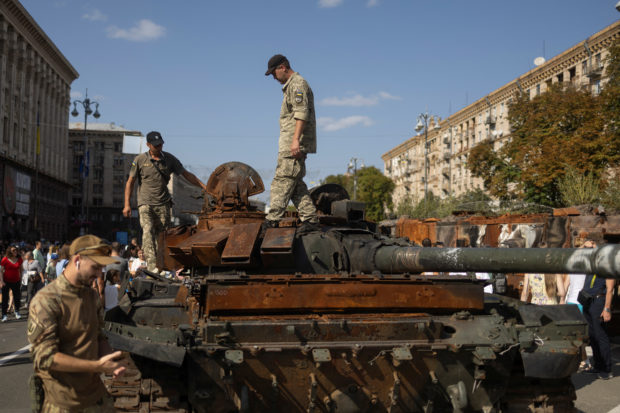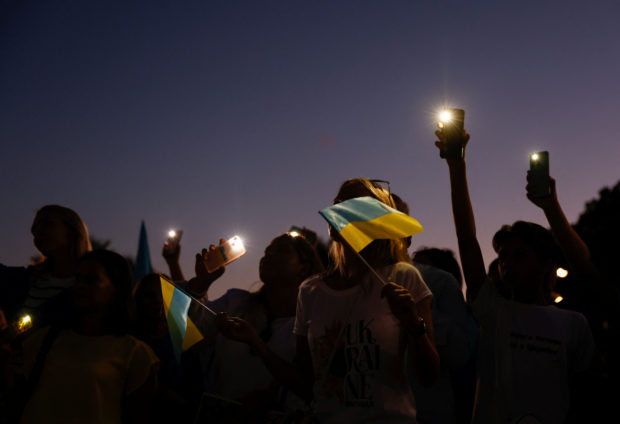Ukraine girds for more violence on Independence Day, war’s six month mark

FILE PHOTO: Ukrainian servicemen inspect a tank as they visit an exhibition of destroyed Russian military vehicles and weapons, dedicated to the upcoming country’s Independence Day, amid Russia’s attack on Ukraine, in the centre of Kyiv, Ukraine August 21, 2022. REUTERS / Valentyn Ogirenko
KYIV — Ukrainians on Wednesday mark 31 years since they broke free from the Russia-dominated Soviet Union in what is certain to be a day of subdued, but defiant celebrations overshadowed by fears of new Russian missile attacks.
Ukraine’s Independence Day, which falls six months since Russia’s Feb. 24 invasion, has this year taken on hallowed significance for Ukrainians determined not to fall back under Moscow’s yoke.
Ukrainian President Volodymyr Zelensky warned late on Tuesday of the possibility of “repugnant Russian provocations” and “brutal strikes” by Moscow to cast a pall over what he said was an important day for all Ukrainians.
Officials have banned public gatherings in the capital Kyiv and imposed a hard curfew in the eastern city of Kharkiv, which has weathered months of shelling on the front lines. Many government officials have been ordered to work from home.
READ: Ukraine’s capital bans Independence Day festivities, fearing Russian attack
Article continues after this advertisementUkraine broke free of the Soviet Union in August 1991 after the failed putsch in Moscow and an overwhelming majority of Ukrainians voted in a referendum to declare independence.
Article continues after this advertisementZelensky has not disclosed how the government will mark the public holiday, one of Ukraine’s most important, for public security reasons, but he has made clear that it will.
Ukraine laid out the carcasses of burnt-out Russian tanks and armored vehicles like war trophies in central Kyiv in a show of defiance ahead of the public holiday.
“We must be aware that disgusting Russian provocations and brutal strikes are possible,” Zelensky said in a video address.
He has led his country’s resistance since Russian troops poured over the border in what Moscow calls a “special military operation” to demilitarize its smaller neighbor. Ukraine and its Western allies accuse Russian President Vladimir Putin of an unprovoked, imperial-style war.
Authorities urged people to take air raid warnings seriously and seek shelter when sirens sound.
“We are fighting against the most terrible threat to our statehood and also at a time when we have achieved the greatest level of national unity,” Zelensky said in his speech.
The Kyiv city administration banned large public gatherings until Thursday, fearing that a crowd of celebrating residents could become a target for a Russian missile strike.
“They will receive a response, a powerful response,” Zelensky told a news conference on Tuesday.
Solidarity
Allies of Ukraine, including the United States – which has sent $10.6 billion in security assistance and plans to send $3 billion more to coincide with Independence Day – were also concerned about Russian attacks.

Ukrainians in Malta take part in a demonstration ahead of Ukraine’s Independence Day and six months since the Russian invasion began, in Valletta, Malta, August 23, 2022. REUTERS/Darrin Zammit Lupi
The United States said it believed Russia would target civilian and government infrastructure in coming days. U.S. citizens should leave Ukraine “now”, the U.S. Embassy said.
U.S. Secretary of State Antony Blinken, in a virtual conference on Tuesday to express solidarity with the Kyiv government, said, “No country should be able to redraw another’s borders by force.”
“We must keep raising the costs and international pressure on President Putin and his enablers until the rights of the Ukrainian people and their sovereign country are respected,” Blinken said in remarks to the so-called Crimea Platform.
Russia annexed the Crimean Peninsula in 2014 and has been using it as a base for attacks during the invasion.
Zelensky addressed the conference and told reporters later: “We will take back Crimea – it is our territory. We will do this in any way which we decide.”
The war in Ukraine has caused thousands of deaths, forced over a third of Ukraine’s 41 million people from their homes and destroyed whole cities, but it is largely locked in a stalemate.
In addition to Crimea, Russian forces control areas of the south, including along the Black Sea and Sea of Azov coasts, and chunks of the eastern Donbas region, which comprises the provinces of Luhansk and Donetsk.
No signs of peace
Talks in March broke down and there have been no signs that peace negotiations could be convened soon.
One area of deep concern to the warring parties and other countries are the circumstances at the Russian-occupied Zaporizhzhia nuclear power plant in the southern Ukrainian city of Enerhodar because Russia and Ukraine have repeatedly accused each other of firing at the plant.
In an indication of some progress toward the plant being inspected by an independent monitor, the U.N. nuclear watchdog on Tuesday said it will visit within days if talks to gain access succeed.
“I’m continuing to consult very actively and intensively with all parties,” International Atomic Energy Agency chief Rafael Grossi said in a statement. “The mission is expected to take place within the next few days if ongoing negotiations succeed.”
Pro-Moscow forces took over the plant soon after the invasion began but it is still operated by Ukrainian technicians. The United Nations has called for the area to be demilitarised.
Ukraine’s armed forces have said almost 9,000 military personnel have been killed in the war so far. Russia has not said how many military personnel it has lost but U.S. intelligence estimates the Russian death toll at 15,000.
At a military cemetery in Vladikavkaz, capital of the Russian republic of North Ossetia on Tuesday a cemetery assistant and florist, Olga Gryaznova, said:
“I really don’t understand who needed this war. The mothers, too, keep asking the question ‘Who needed this war?’ I have no answer for them. Maybe it was meant to be this way. Maybe it was God’s will, up there. I don’t know.”
RELATED STORY:
After six months of war, what’s next for Ukraine?